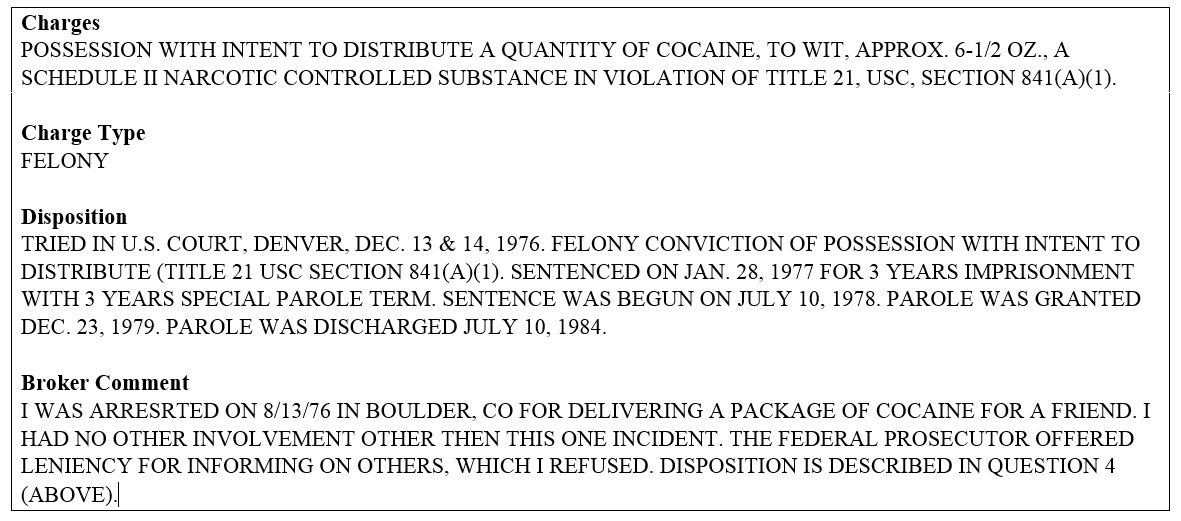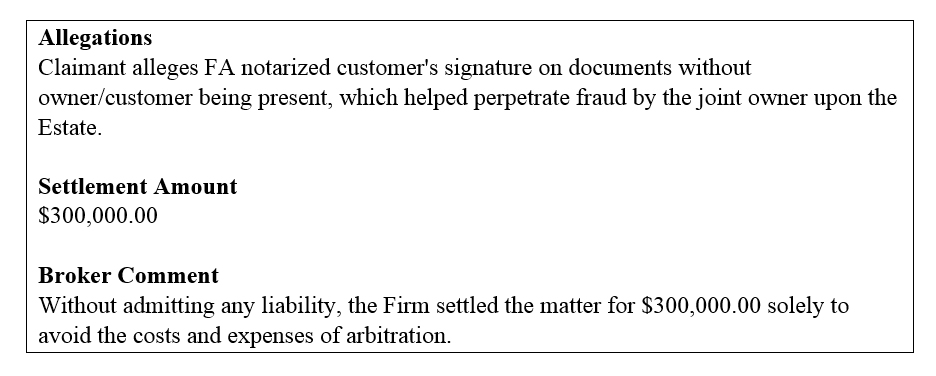Warning: 3 Serious Red Flags about Financial Advisers
Disclosures pulled from actual adviser profiles show three major red flags you don’t want your financial professional to have.


Profit and prosper with the best of Kiplinger's advice on investing, taxes, retirement, personal finance and much more. Delivered daily. Enter your email in the box and click Sign Me Up.
You are now subscribed
Your newsletter sign-up was successful
Want to add more newsletters?

Delivered daily
Kiplinger Today
Profit and prosper with the best of Kiplinger's advice on investing, taxes, retirement, personal finance and much more delivered daily. Smart money moves start here.

Sent five days a week
Kiplinger A Step Ahead
Get practical help to make better financial decisions in your everyday life, from spending to savings on top deals.

Delivered daily
Kiplinger Closing Bell
Get today's biggest financial and investing headlines delivered to your inbox every day the U.S. stock market is open.

Sent twice a week
Kiplinger Adviser Intel
Financial pros across the country share best practices and fresh tactics to preserve and grow your wealth.

Delivered weekly
Kiplinger Tax Tips
Trim your federal and state tax bills with practical tax-planning and tax-cutting strategies.

Sent twice a week
Kiplinger Retirement Tips
Your twice-a-week guide to planning and enjoying a financially secure and richly rewarding retirement

Sent bimonthly.
Kiplinger Adviser Angle
Insights for advisers, wealth managers and other financial professionals.

Sent twice a week
Kiplinger Investing Weekly
Your twice-a-week roundup of promising stocks, funds, companies and industries you should consider, ones you should avoid, and why.

Sent weekly for six weeks
Kiplinger Invest for Retirement
Your step-by-step six-part series on how to invest for retirement, from devising a successful strategy to exactly which investments to choose.
Did you know that anyone can use the title “financial adviser”? That’s why it’s crucial for investors to know what to look for in a financial professional. But even when you find a financial adviser who checks off many of the boxes you’re interested in, there may be some red flags lurking in the shadows if you don’t know where to shine your flashlight.
How do we find these troublesome adviser disclosures, and what are the red flags to you should be wary of?
Examples of Actual Disclosures
Investment advisers generally are required to disclose a variety of regulatory, disciplinary or criminal charges. Below are actual disclosures pulled from advisers’ profiles.
From just $107.88 $24.99 for Kiplinger Personal Finance
Become a smarter, better informed investor. Subscribe from just $107.88 $24.99, plus get up to 4 Special Issues

Sign up for Kiplinger’s Free Newsletters
Profit and prosper with the best of expert advice on investing, taxes, retirement, personal finance and more - straight to your e-mail.
Profit and prosper with the best of expert advice - straight to your e-mail.
While ultimately each individual needs to make their own decision about the importance of such disclosures, here are some that you may find especially concerning and might not expect from a financial professional.
1. Felony Convictions or Charges
When you vet a potential financial adviser via BrokerCheck you probably don’t want to see a felony conviction or charge. A financial adviser who breaks the law and is found guilty is troubling, to say the least, and probably wouldn’t sit well with most investors.

2. Allegations of Fraud
Even if a financial adviser claims no liability for an allegation of fraud, a large settlement could signal some degree of guilt for the claim brought against an individual or his firm. As an investor, you want to avoid any financial adviser who has a claim of fraud against him or her. The risk of working with someone who has the potential to defraud you is likely not worth any proposed benefit.

3. Allegations of Unsuitable Investments/Breach of Fiduciary Duty
Claims that an investor was put into unsuitable investments are serious business. They typically mean that the claimant was harmed by the actions of his or her financial adviser. In other words, the financial adviser likely put his or her interests ahead of the investor. Here’s an example of something you don’t want to see on your financial adviser’s disclosure record:

Doing Your Own Search for Disclosures
In order to find these disclosures, you need to know where your adviser is registered. (If you are not sure, see How to Check a Financial Adviser's Credentials the Right Way.) For financial advisers registered with a broker-dealer, check for disclosures at BrokerCheck. For financial advisers who are independent and registered with the state, check the Investment Advisor Public Disclosure (IAPD) website and then look at Part 2 of the firm’s filed ADV.
What to Do About Red Flags
Look for red flags when considering a financial adviser and take them seriously. Your financial well-being is crucial to your future, and you deserve to work with an honest, ethical professional. If any situations cause you to pause, I encourage you to follow your instincts and err on the side of caution.
If the financial adviser you’re currently working with has any red flags you find after the fact, don’t hesitate to ask him or her about them and express your concerns. And if you’re not satisfied with the conversation, it’s probably time to move on.
Conclusion
Being able to trust the people who help manage your money is a must. Knowing the red flags to watch out for can only help you make an informed decision about who you hire as your financial adviser.
Profit and prosper with the best of Kiplinger's advice on investing, taxes, retirement, personal finance and much more. Delivered daily. Enter your email in the box and click Sign Me Up.

Paul Sydlansky, founder of Lake Road Advisors LLC, has worked in the financial services industry for over 20 years. Prior to founding Lake Road Advisors, Paul worked as relationship manager for a Registered Investment Adviser. Previously, Paul worked at Morgan Stanley in New York City for 13 years. Paul is a CERTIFIED FINANCIAL PLANNER™ and a member of the National Association of Personal Financial Advisors (NAPFA) and the XY Planning Network (XYPN).
-
 Quiz: Do You Know How to Avoid the "Medigap Trap?"
Quiz: Do You Know How to Avoid the "Medigap Trap?"Quiz Test your basic knowledge of the "Medigap Trap" in our quick quiz.
-
 5 Top Tax-Efficient Mutual Funds for Smarter Investing
5 Top Tax-Efficient Mutual Funds for Smarter InvestingMutual funds are many things, but "tax-friendly" usually isn't one of them. These are the exceptions.
-
 AI Sparks Existential Crisis for Software Stocks
AI Sparks Existential Crisis for Software StocksThe Kiplinger Letter Fears that SaaS subscription software could be rendered obsolete by artificial intelligence make investors jittery.
-
 Social Security Break-Even Math Is Helpful, But Don't Let It Dictate When You'll File
Social Security Break-Even Math Is Helpful, But Don't Let It Dictate When You'll FileYour Social Security break-even age tells you how long you'd need to live for delaying to pay off, but shouldn't be the sole basis for deciding when to claim.
-
 I'm an Opportunity Zone Pro: This Is How to Deliver Roth-Like Tax-Free Growth (Without Contribution Limits)
I'm an Opportunity Zone Pro: This Is How to Deliver Roth-Like Tax-Free Growth (Without Contribution Limits)Investors who combine Roth IRAs, the gold standard of tax-free savings, with qualified opportunity funds could enjoy decades of tax-free growth.
-
 One of the Most Powerful Wealth-Building Moves a Woman Can Make: A Midcareer Pivot
One of the Most Powerful Wealth-Building Moves a Woman Can Make: A Midcareer PivotIf it feels like you can't sustain what you're doing for the next 20 years, it's time for an honest look at what's draining you and what energizes you.
-
 I'm a Wealth Adviser Obsessed With Mahjong: Here Are 8 Ways It Can Teach Us How to Manage Our Money
I'm a Wealth Adviser Obsessed With Mahjong: Here Are 8 Ways It Can Teach Us How to Manage Our MoneyThis increasingly popular Chinese game can teach us not only how to help manage our money but also how important it is to connect with other people.
-
 Looking for a Financial Book That Won't Put Your Young Adult to Sleep? This One Makes 'Cents'
Looking for a Financial Book That Won't Put Your Young Adult to Sleep? This One Makes 'Cents'"Wealth Your Way" by Cosmo DeStefano offers a highly accessible guide for young adults and their parents on building wealth through simple, consistent habits.
-
 Global Uncertainty Has Investors Running Scared: This Is How Advisers Can Reassure Them
Global Uncertainty Has Investors Running Scared: This Is How Advisers Can Reassure ThemHow can advisers reassure clients nervous about their plans in an increasingly complex and rapidly changing world? This conversational framework provides the key.
-
 I'm a Real Estate Investing Pro: This Is How to Use 1031 Exchanges to Scale Up Your Real Estate Empire
I'm a Real Estate Investing Pro: This Is How to Use 1031 Exchanges to Scale Up Your Real Estate EmpireSmall rental properties can be excellent investments, but you can use 1031 exchanges to transition to commercial real estate for bigger wealth-building.
-
 Should You Jump on the Roth Conversion Bandwagon? A Financial Adviser Weighs In
Should You Jump on the Roth Conversion Bandwagon? A Financial Adviser Weighs InRoth conversions are all the rage, but what works well for one household can cause financial strain for another. This is what you should consider before moving ahead.